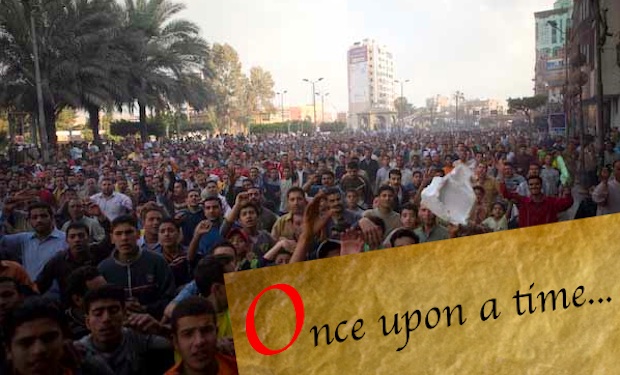
Once upon a time, DARPA wanted to work out how stories played a role in sharing information between people who are engaged in political activity, and possibly how to change the direction of the course of events.
More accurately: On Feb. 28, DARPA is hosting a think-tank-style workshop to tackle "Analysis and Decomposition of Narratives in Security Contexts" as part of its Stories, Neuroscience, and Experimental Technologies (STORyNET) program. Jargon aside, it's really like the bedtime version of 1984's Thought Police.
As DARPA notes, "stories exert a powerful influence on human thoughts and behavior. They consolidate memory, shape emotions, cue heuristics and biases in judgment, influence in-group/out-group distinctions, and may affect the fundamental contents of personal identity." Sure the research group leapfrogs the argument that narratives played a vital role in early human survival (allowing transfer of best-practise knowledge) and modern social evolution (as in the Bible, Koran). (There are even myths about this concept.) But let's go with it. DARPA's not talking about campfire chats, anyway, it's talking about narrative discussions between people--often from an authority figure to a group. It highlights there's "no surprise that these influences make stories highly relevant to vexing security challenges such as radicalization, violent social mobilization, insurgency, and terrorism."
Hence the workshop to try to learn how stories connect to people's minds, how they influence or prejudice individual thinking, and whether the flow of narrative information sharing in a group can be influenced by an outside agent--all in a "scientifically respectable manner."
Yes, that does sound creepy.
The workshop has three goals. It will survey theories about narrative data flow to work out "what is a story? What are its moving parts?" and more. It will try to understand how narratives influence security situations, asking "how do stories influence bystanders' response to conflict" and other questions. And it will survey the state of the art in story analysis and decomposition, with a goal of building a better toolset for quickly understanding the nature of a story, and "how stories propagate in a system to influence behavior."
This is all about situational analysis at first, but ultimately it's about psy-ops. DARPA is trying to work out how narrative discussions in society--be they on TV, in person, over cell phones or via social media/IM systems--influence political acts like radicalization of potential terrorists in Afghanistan or the social upheaval in Egypt. Once it has a tool for working this out, the natural next step is to try to work out how US forces could influence stories to result in a more favorable outcome (for the U.S.).
Fascinating, and it's also worth remembering that DARPA is working on software to predict criminal acts like the Arizona shooting ahead of time. But let's just say the Pentagon doesn't have a particularly good track record in this kind of research and work--at least that we know of. Just this last week or so it's emerged that government political analysis and modeling software failed to predict Egyptian unrest, and didn't even predict how the crowd-based revolution would evolve: The head of the CIA was called before Congress to explain.
We're reminded of a Douglas Adams quote at this point: "in fact, looking at Pentagon policies over the last couple of years I think I can be fairly sure that the US Navy is using version 2.00 of the program, while the Air Force for some reason only has the beta-test version of 1.5. Odd, that."
[Image via Flickr user James Buck]
To read more news like this, follow Fast Company on Twitter: Click here.